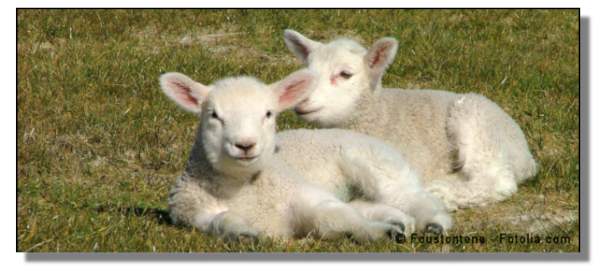Continuing in the sacrificial tradition
Vayikra & Hahodesh
For the week of March 21, 2015 / 1 Nisan 5775
Torah: Vayikra/Leviticus 1:1 - 5:26 & Shemot/Exodus 12:1-20
Haftarah: Ezekiel 45:16-46
Revised version of message posted March 18, 2000 / 11 Adar 2 5760
So Many Sacrifices!

Speak to the people of Israel and say to them, When any one of you brings an offering to the LORD, you shall bring your offering of livestock from the herd or from the flock. (Vayikra / Leviticus 1:2)
I don't know about you, but every time I read about the sacrifices in the Torah, I am really struck by how foreign it all seems to me. While animal sacrifice was so much a part of the biblical world - and there are still cultures today that practice it - it means just about nothing to me. I would assume that most of you reading or listening to this have never seen an animal butchered, let alone witnessed one offered in a ceremony.
Our current culture doesn't make it easy to understand life from the Torah's perspective. The ancient sacrificial system was ordained by God, and it played an essential role in the life of God's people. If we are to develop a biblical world view, we need to discover the relevance of these sacrifices.
God through Moses ordained sacrifices for a great many occasions, both for individuals and for the community. There were sacrifices for wrong actions, for thanksgiving, for cleansing, and for guilt. There were sacrifices made in response to harvesting food, for jealousy between a man and his wife, and in the setting apart of religious leaders. Special sacrifices were offered during Sabbaths and festivals. So Many Sacrifices! The cohanim (priests) and the Levites would be busy all day receiving animals to offer to God.
God commanded the sacrifices to be made. The religious system he instituted demanded it. Animals died. Blood was poured out. To maintain relationship with God these rituals had to be done. I know it is difficult for us to understand, but that is beside the point.
To us the slaughtering of living things for spiritual interests sounds horrible. But we fail to see how much more horrible our alienation from God is. In God's wisdom, it was necessary to be continually confronted with death. The reason? So that we could find real life in God.
If sacrifice was such an essential aspect of biblical ritual, why does it have no place today? The smell and mess of sacrifice provided a striking image of what biblical faith was all about. Yet today's versions of biblical religions are bloodless.
If someone had to provide a reason for the absence of sacrifice in our day, my guess is that most people would say it had to do with evolution of thought. They would assume that over time people's understanding of life caused them to outgrow the need to sacrifice animals. Now we know better, they assert. But, historically, that is not what happened.
Judaism stopped sacrificing because of the destruction of the Temple by the Romans. Knowing that sacrifice was to have a central place in the religion however, the ancient rabbis developed substitutions: prayer, repentance and giving to charity. But these substitutions eclipse the meaning of true sacrifice, especially since religious activities are not sacrifices.
Because of our sins and our rebellion against God, innocent animals had to die in our place. Years and years of sacrifice were designed to demonstrate that we could not make amends for ourselves.
There's another Jewish take on the ending of animal sacrifice. The Jewish followers of Yeshua also stopped sacrificing because the Temple was destroyed, but they did not develop substitutes. Instead they understood that Yeshua's death was the final and perfect sacrifice of which the animal sacrifices in the Torah foreshadowed.
So, by believing in Yeshua we actually continue in the sacrificial tradition of the Torah. All the benefits that the ancient sacrifices sought to provide are fully ours through him. Since by believing in Yeshua, we continue in the sacrificial tradition, maybe it's a good idea to get a better grasp of all those Torah sacrifices after all.
---
Unless otherwise noted, scripture quotations are from The Holy Bible,
English Standard Version®, copyright © 2001 by Crossway Bibles, a
publishing ministry of Good News Publishers. Used by permission. All
rights reserved.
Comments? E-mail: comments@torahbytes.org
Subscribe?
To have TorahBytes e-mailed to
you weekly, enter your e-mail address and press Subscribe
[ More TorahBytes ] [ TorahBytes Home ]
